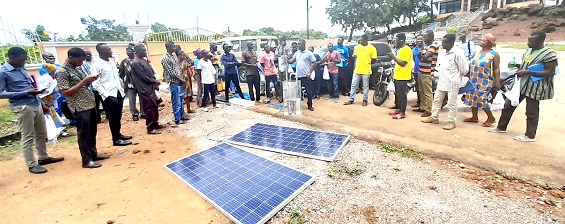
Northern farmers adopt solar-powered irrigation system
Most smallholder vegetable farmers in three of the northern regions have agreed to adopt the solar-powered irrigation system in their quest to ensure all-year-round vegetable production in their areas.
The farmers grow their crops in the Upper West, Savannah and North-East regions.
They agreed to adopt the solar-powered system of irrigation at a workshop organised by the Market Oriented Agriculture Programme in North-West Ghana (MOAP- NW), for vegetable farmers, meant to share ideas on how best to promote good agronomic practices in the area.
The workshop was also to introduce to the farmers, solar technologies to replace their petroleum-fed generators, which is proving expensive for them.
The collaborating partners in the drive to move the farmers to solar irrigation are the International Water Management Institute (IWMI) and Pumptech, an irrigation equipment distribution company.
Most of the vegetable farmers had hitherto resorted to petroleum-powered irrigation systems, which were proving too expensive to maintain and to enable them to engage in all-year-round vegetable farming since they experience only one rainy season.
The MOAP-NW programme, implemented by GIZ with funding from the European Union and the German Federal Ministry of Economic Cooperation and Development, has decided to subsidise the cost of the solar technologies by 50 per cent for women and 40 per cent for their male counterparts.
The programme, which is being implemented in partnership with the Ministry of Food and Agriculture, is aimed at increasing the productivity of smallholder farmers in vegetables, to enhance their livelihoods and generate economic opportunities and growth.
The collaboration for solar irrigation equipment was struck among IWMI, Pumptech and MOAP-NW in 2021, to boost the demand and supply linkages to catalyse the scaling of irrigation technologies and services, especially solar power-based irrigation technology.
The supply and access to irrigation equipment is being spearheaded by IWMI and Pumptech, which have undertaken research work on how the beneficiaries can obtain information and harness the available water bodies, including wells and rivers for all year vegetable farming.
Irrigation
A Research Technician of IWMI, Desire Naab, who touched on the importance of irrigation water to crops, said since 2013 they had been working on how to scale up irrigation technologies and water management solutions in the northern part of the country.
He said these technologies and practices had been validated to increase agricultural productivity under irrigated conditions.
As a result of this, he said IWMI was partnering Pumptech, an irrigation equipment distribution company, to introduce best agricultural practices to smallholder farmers to enhance their activities.
He said through the partnership, with Pumptech and MOAP-NW, IWMI decided to pilot the solar power-based irrigation equipment in the Upper West Region.
An official of Pumptech, Moses Tampoe, said he was happy that the farmers had decided to embrace the solar power-based pump technologies, which although comes with heavy investment, had a longer life span and was cheaper to maintain since the sun was readily available.
Mr Tampoe said that would resuscitate the agricultural sector in order to improve the economy, adding that they would ensure the installation and maintenance of the solar machines as well as build the capacities of the farmers on how to use them.
A female vegetable farmer, Regina Misah, expressed the excitement of the smallholder farmers that the project would offer them an opportunity to improve their livelihood.
